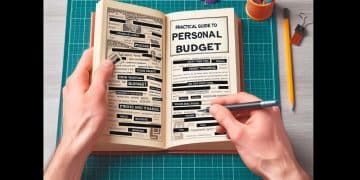Master Your Finances: The Art of Personal Budgeting


**Personal Budgeting: Mastering Financial Management**
Anúncios
Managing personal finances is becoming an essential skill in today’s modern world. The ability to create and maintain a personal budget serves as the foundation for financial stability. Without proper budgeting, financial life can spiral into stress, accumulating debts without clear insights. Regardless of your life stage, understanding how to budget effectively can pave the way for achieving financial goals and peace of mind.
A personal budget helps in creating a roadmap for financial decisions. When thoughtfully crafted, it can relieve stress tied to financial uncertainty, allowing individuals to focus on other life aspects. Budgeting is not just about cutting spending; rather, it’s about making informed decisions that align with priorities and life goals. Taking the time to adopt a useful budgeting method starts with acknowledging its importance and potential benefits.
Whether you’re saving for future endeavors, tackling outstanding debt, or simply trying to manage daily expenses, a comprehensive understanding of personal budgeting empowers you to take control of your finances. The aim is to guide you through essential steps and mindset shifts, aiding you in crafting a budget that supports your life plan. This article dives into practical advice and insights designed to elevate your financial management skills.
Understanding Personal Budgeting Essentials
Budgeting is more than keeping your expenses in check; it’s about planning for the future. Begin by identifying what you aim to achieve financially, such as buying a home or paying off loans. By documenting these goals, you establish a constant reminder of the importance of your budgeting journey. Regularly reviewing these objectives can keep you motivated on your path.
Tracking both your income and outflows is crucial for any effective budgeting. Start with a comprehensive list of income sources, recognizing everything from regular salary to side gigs. Next, assess your expenditures. Divide these into essential costs, like rent and utilities, and non-essential spending. Tools like budgeting apps can simplify this tracking process, providing a clearer financial picture.
Armed with income and expenditure insights, develop a personalized budget that fits your lifestyle. Methods such as the 50/30/20 rule or the envelope system cater to diverse preferences. Experimenting with different tactics can help you find an approach that not only supports your financial well-being but also enhances sustainability, ensuring your budgeting strategy is adaptable and effective.
Implementing and Adjusting Your Budget
Your budget isn’t set in stone; it should evolve with your circumstances and needs. Regularly reviewing and updating your budget is critical, accounting for any changes like salary increases or unexpected expenses. This practice ensures you remain aligned with your financial goals while staying adaptable to life’s ebbs and flows.
Enforcing budget discipline means fostering self-control with spending decisions. Impulse buys can sabotage even well-planned budgets; implementing strategies like waiting periods for non-essential purchases can mitigate this. Understanding your financial principles will guide smarter purchasing habits, keeping on track with long-term objectives.
Celebrate the small wins in achieving your financial goals, as recognizing progress upholds motivation and builds momentum. Achievements like clearing a small debt or reaching a savings milestone deserve acknowledgment and can spur continued financial discipline, maintaining a positive mindset toward budgeting efforts.
Key Characteristics of Personal Budgeting
- Goal Setting: Giving direction to your financial efforts.
- Tracking: Understanding where money comes from and where it goes.
- Flexibility: Allowing for adjustments based on life changes.
- Discipline: Enforcing consistency in financial habits.
- Celebration: Recognizing success to encourage ongoing compliance.
Benefits of Personal Budgeting
Engaging in budgeting presents several benefits that extend beyond mere financial gain. It promotes financial awareness, making individuals conscious of their spending habits and encouraging mindful choices. Enhanced financial literacy is a byproduct of effective budgeting, offering insights into money management that empower more informed decision-making.
Budgeting allows for the realization of financial independence, progressing toward significant life goals such as home ownership or retirement savings. The reduction in financial stress that budgeting provides frees mental space for setting new aspirations or diving into personal interests. This holistic approach to money management makes budgeting a valuable skill for anyone eager to secure their financial future.
As you navigate your personal budgeting journey, cultivating patience and openness to learning enhances the experience. Recognizing budgeting as a dynamic process means expecting occasional missteps yet leveraging them as learning opportunities. This mindset fosters resilience, encouraging continued commitment to budgeting practices.
Through the challenges and successes, budgeting teaches valuable lessons that extend beyond money. Building patience, discipline, and persistence strengthens overall life skills, ensuring a balanced, fulfilling life that aligns with your deepest values and objectives. With dedication, the journey of personal budgeting morphs into an ongoing investment in life’s quality.
By integrating budgeting seamlessly into daily life, individuals realize the broader benefits of heightened control over financial futures. Ultimately, the journey is about developing a strategic approach that balances today’s needs with tomorrow’s dreams. Successful budgeting provides a blueprint for living intentionally and harmonizing both financial and personal growth aspirations.
- Financial Control: Understanding and regulating spending patterns.
- Peace of Mind: Alleviation of financial stress through planning.
- Goal Achievement: Reaching set financial targets with intention.
- Learning: Enhancing financial literacy and life skills.
- Empowerment: Feeling empowered to make savvy financial decisions.





